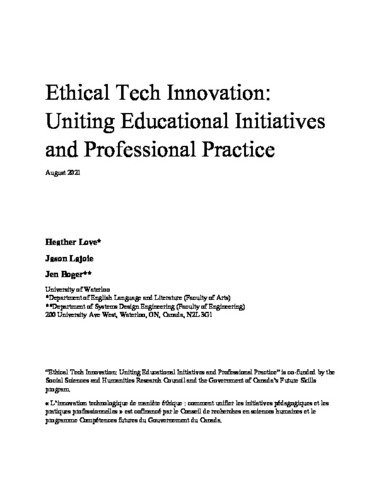| dc.contributor.author | Love, Heather | |
| dc.contributor.author | Lajoie, Jason | |
| dc.contributor.author | Boger, Jennifer | |
| dc.date.accessioned | 2021-12-15 19:26:54 (GMT) | |
| dc.date.available | 2021-12-15 19:26:54 (GMT) | |
| dc.date.issued | 2021-08 | |
| dc.identifier.uri | http://hdl.handle.net/10012/17764 | |
| dc.description | This Knowledge Synthesis Report, “Ethical Tech Innovation: Uniting Educational Initiatives and Professional Practice,” is co-funded by the Social Sciences and Humanities Research Council and the Government of Canada’s Future Skills program. | en |
| dc.description.abstract | Engineers and other workers at the forefront of technological innovation play a central role in shaping the future of our digital economy, and the COVID-19 pandemic has revealed with stark clarity the urgent need for ethical conversations about the ways technologies are developed and integrated into society. However, there is inadequate understanding about effective methods for integrating ethical training in engineering academia, both in terms of the types of training required and how best to implement this training within existing engineering programs. This neglect poses significant challenges for the engineering profession, particularly since it makes it difficult for educators to effectively deliver and assess ethical training. Going beyond engineering, the consequences of this lack are significant: perpetuating technological bias and inequities, environmental degradation, and a culture that is apathetic to the impacts of technological innovation. This Knowledge Synthesis report, funded by the Social Sciences and Humanities Research Council (SSHRC), responds to this gap in two ways: summarising preliminary findings of a literature review from the past ten years to identify recent knowledge and gaps on effective approaches to embedding ethics in the tech industry; and, synthesizing results of semi-structured interviews with 10 key industry leaders and experts about the need for and barriers of ethics training in engineering. Recommendations for academia, industry, and government are provided to cultivate ethical interventions in academia and industry teaching and training. While the literature presents a great deal of exemplary efforts to grow and embed ethics training, our analysis finds that the status of these efforts in engineering disciplines remain sporadic, transitory, and idiosyncratic. This report therefore aims to empower engineers, engineering educators, administrators, industry professionals, policymakers, and even members of the public to develop new ways to prioritize and embed robust frameworks for ethical thinking in tech sector and engineering culture more broadly. | en |
| dc.description.sponsorship | Social Sciences and Humanities Research Council of Canada || Canada's Future Skills Program | en |
| dc.language.iso | en | en |
| dc.publisher | Social Sciences and Humanities Research Council of Canada | en |
| dc.rights | Attribution 4.0 International | * |
| dc.rights.uri | http://creativecommons.org/licenses/by/4.0/ | * |
| dc.subject | engineering education | en |
| dc.subject | education policy | en |
| dc.subject | ethics training | en |
| dc.subject | engineering ethics | en |
| dc.subject | engineering curriculum | en |
| dc.subject | responsible innovation | en |
| dc.subject | sustainability | en |
| dc.title | Ethical Tech Innovation: Uniting Educational Initiatives and Professional Practice | en |
| dc.type | Technical Report | en |
| dcterms.bibliographicCitation | Love, H.A., J. Lajoie, and J. Boger. 2021. “Ethical Tech Innovation: Uniting Educational Initiatives and Professional Practice.” Knowledge Synthesis Report prepared for the Social Sciences and Humanities Research Council of Canada and Canada’s Future Skills Program. | en |
| uws.contributor.affiliation1 | Faculty of Arts | en |
| uws.contributor.affiliation1 | Faculty of Engineering | en |
| uws.contributor.affiliation2 | Biomedical Engineering | en |
| uws.contributor.affiliation2 | English Language and Literature | en |
| uws.contributor.affiliation2 | Systems Design Engineering | en |
| uws.typeOfResource | Text | en |
| uws.peerReviewStatus | Unreviewed | en |
| uws.scholarLevel | Faculty | en |
| uws.scholarLevel | Post-Doctorate | en |


